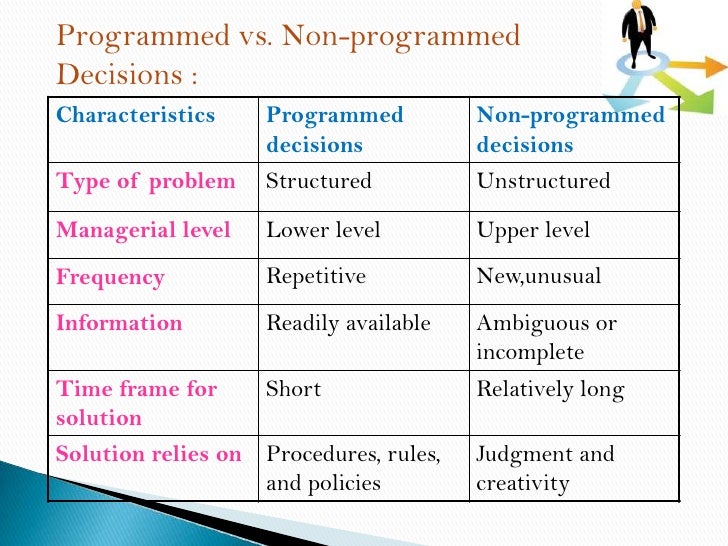Characteristics Of Non Programmed Decisions
What are the key characteristics of non-programmed decisions?
Non-programmed decisions are characterized by their novelty and uniqueness, requiring a customized approach that differs from routine decisions. The complexity and uncertainty surrounding these decisions make them challenging to address, often involving multiple variables and factors that need to be considered. Additionally, non-programmed decisions are high-stakes, with the potential to significantly impact the organization's performance and future outcomes.How do non-programmed decisions differ from programmed decisions?
Unlike programmed decisions, which follow established procedures and guidelines, non-programmed decisions are unstructured and demand a higher level of creativity and judgment. While programmed decisions are routine and repetitive, non-programmed decisions are unique and often require a more flexible and adaptive approach. The distinction between the two types of decisions lies in their complexity, level of uncertainty, and potential impact on the organization.What are the implications of non-programmed decisions for organizational leaders?
For organizational leaders, non-programmed decisions pose a significant challenge due to their complexity, uncertainty, and high-stakes nature. Effectively addressing non-programmed decisions requires a combination of analytical thinking, creativity, and risk assessment. Leaders must be prepared to navigate unfamiliar territory and make tough choices that can shape the organization's future. The ability to adapt to unforeseen circumstances and make informed decisions is crucial for leaders facing non-programmed decisions.How can organizations effectively address non-programmed decisions?
Organizations can enhance their ability to address non-programmed decisions by fostering a culture of innovation, creativity, and strategic thinking. Encouraging open communication, collaboration, and diverse perspectives can help organizations approach non-programmed decisions with a broader and more comprehensive view. Additionally, investing in training and development programs that promote critical thinking and decision-making skills can better prepare employees to tackle non-programmed decisions effectively.What role does strategic planning play in addressing non-programmed decisions?
Strategic planning is essential for addressing non-programmed decisions as it provides a framework for evaluating potential scenarios, risks, and opportunities. By engaging in strategic foresight and scenario planning, organizations can anticipate potential non-programmed decisions and develop proactive strategies to address them. Effective strategic planning enables organizations to be more agile and adaptive in responding to unforeseen challenges, ultimately enhancing their ability to make informed and timely decisions.- Debbie Cartisano Where Is Steve Cartisano S
- Sharon Case Net Worth Husband Married Children
- Where To Find All The Princess Quest
- Jon Batiste Bio Age Parents Wife Children
- Brantley Gilbert Age Net Worth Kids Weight

Programmed and NonProgrammed Decision Making Owlgen

50709056 decisionmaking

Types of Decisions at different levels of Management YouTube